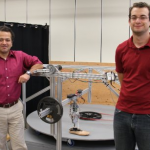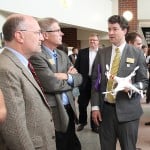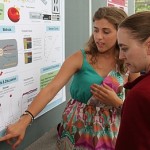Mo Rastgaar has received a National Science Foundation grant of nearly $500,000 to make his new artificial limb design a reality. With the five-year Faculty Early Career Development (CAREER) Award, Rastgaar, an assistant professor of mechanical engineering-engineering mechanics, will further develop his powered ankle-foot prosthesis: an artificial lower leg with the unique ability to restore amputees’ mobility and agility.
Michigan Technological University is a partner in the newly formed $148 million American Lightweight Materials Manufacturing Innovation Institute (ALMMII). The new facility, to be headquartered in the metro-Detroit area, will be part of the National Network of Manufacturing Innovation, a federal initiative to help US manufacturers become more competitive and encourage investment in the United States.
The Department of Materials Science and Engineering and the Department of Mechanical Engineering-Engineering Mechanics are leading the Michigan Tech partnership with ALMMII. MSE Chair Stephen Kampe, Associate Professor Paul Sanders, Professor Walter Milligan and Research Professor Steven Mashl will be primary participants from MSE.
 A graphene water balloon may soon open up new vistas for scientists seeking to understand health and disease at the most fundamental level.
A graphene water balloon may soon open up new vistas for scientists seeking to understand health and disease at the most fundamental level.
Electron microscopes already provide amazingly clear images of samples just a few nanometers across. But if you want a good look at living tissue, look again.
“You can’t put liquid in an electron microscope,” says Tolou Shokuhfar, of Michigan Technological University. “So, if you have a hydrated sample—and all living things are hydrated—you have to freeze it, like a blueberry in an ice cube, and cut it into a million thin pieces, so the electrons can pass through. Only then can you image it to see what’s going on.”
Research by Assistant Professor Mo Rastgaar and graduate student Evandro Ficanha (MEEM) is featured on the website of the American Society of Mechanical Engineers. See “Computer-Controlled Prosthetic Closely Matches Action of Human Legs.” The Mumbai Mirror and Science World Report both published news stories about Assistant Professor Mo Rastgaar’s (ME-EM) work with the Mayo Clinic to develop a prosthetic foot that moves like a real human foot. See The Mumbai Mirror and Science World Report for the full story.
Assistant Professor Mo Rastgaar’s work designing and building a microprocessor-controlled artificial leg has been widely publicized, with more articles like the above appearing in IEEE Spectrum,, Medical Design Online, Gizmag,CNN, UPI Science News and many more outlets. He was also interviewed for Clear Channel One’s radio program Conversations in Health Care.
 Walking is tricky business, as any toddler knows. And while most artificial feet and limbs do a pretty good job restoring mobility to people who have lost a leg, they have a ways to go before they equal the intricacy of a natural gait. As a result, over half of all amputees take a fall every year, compared to about one-third of people over 65.
Walking is tricky business, as any toddler knows. And while most artificial feet and limbs do a pretty good job restoring mobility to people who have lost a leg, they have a ways to go before they equal the intricacy of a natural gait. As a result, over half of all amputees take a fall every year, compared to about one-third of people over 65.
In cooperation with a Mayo Clinic scientist, researchers at Michigan Technological University are taking a giant step toward solving the problem. They are making a bionic foot that could make an amputee’s walk in the park feel, well, like a walk in the park.
The secret lies in the ankle. Mo Rastgaar, an assistant professor of mechanical engineering–engineering mechanics, and PhD student Evandro Ficanha are working on a microprocessor-controlled ankle-foot prosthesis that comes close to achieving the innate range of motion of this highly complex joint.
MORE
A brighter, better, longer-lasting dental implant may soon be on its way to your dentist’s office. Dental implants are posts, usually made of titanium, that are surgically placed into the jawbone and topped with artificial teeth. More than dentures or bridges, implants mimic the look and feel of natural teeth. While most dental implants are successful, a small percentage fail and either fall out or must be removed. A scientist at Michigan Technological University wants to lower that rate to zero using nanotechnology.
 The staff of the Michigan Tech Research Institute (MTRI) in Ann Arbor was on campus on Friday, Sept. 20, to conduct a poster session in the Dow Atrium (sixth-floor campus entrance). MTRI scientists and engineers were also available to discuss projects, collaborations with Michigan Tech departments and staff, and areas of research interest. The session is intended to outline the institute’s current activities and to explore opportunities to develop new working relationships.
The staff of the Michigan Tech Research Institute (MTRI) in Ann Arbor was on campus on Friday, Sept. 20, to conduct a poster session in the Dow Atrium (sixth-floor campus entrance). MTRI scientists and engineers were also available to discuss projects, collaborations with Michigan Tech departments and staff, and areas of research interest. The session is intended to outline the institute’s current activities and to explore opportunities to develop new working relationships.
MTRI, a research center of Michigan Technological University, is a recognized leader in the research, development and practical application of sensor and information technology to solve critical problems in national security, protecting and evaluating critical infrastructure, bioinformatics, earth sciences and environmental processes.
 Wade Aitken-Palmer, of Kansas City, Mo., is among the 35 Michigan Technological University Master’s International students currently combining Peace Corps service with a graduate degree. He has been serving as a science teacher volunteer in Ghana since June 2012 and is pursuing a master’s degree in Mechanical Engineering from MTU
Wade Aitken-Palmer, of Kansas City, Mo., is among the 35 Michigan Technological University Master’s International students currently combining Peace Corps service with a graduate degree. He has been serving as a science teacher volunteer in Ghana since June 2012 and is pursuing a master’s degree in Mechanical Engineering from MTU
Nanosatellites are smartphone-sized spacecraft that can perform simple, yet valuable, space missions. Dozens of these little vehicles are now tirelessly orbiting the earth performing valuable functions for NASA, the Department of Defense and even private companies.
 The Center for Diversity and Inclusion sponsored this year’s MiCUP/MI-LSAMP Research Gallery Walk, held on Thursday, June 20, in the Rozsa Center Lobby.
The Center for Diversity and Inclusion sponsored this year’s MiCUP/MI-LSAMP Research Gallery Walk, held on Thursday, June 20, in the Rozsa Center Lobby.
The event recognizes the research of students participating in the seven-week Michigan College/University Partnership Program (MiCUP) and the Michigan Louis Stokes Alliance for Minority Participation (MI-LSAMP) Program here at Michigan Tech.
Michigan Tech is partnered with MI-LSAMP to continue our shared goal of increasing the number of underrepresented minority and first-generation students in STEM and non-STEM fields.